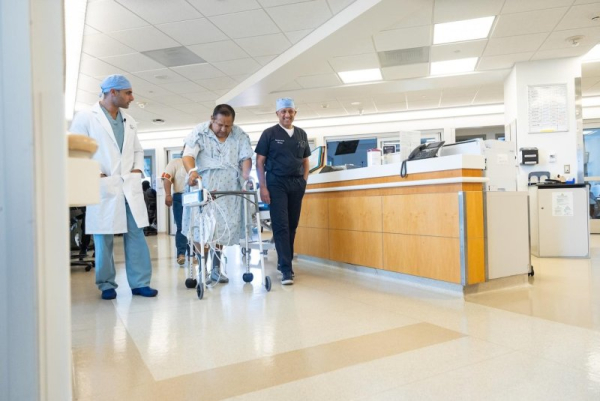World’s first-ever human bladder transplant carried out by UCLA, USC surgeons


1 of 2 | Transplant recipient Oscar Larrainzar is flanked by UCLA’s Dr. Nima Nassiri (L) and USC’s Dr. Inderbir Gill as they walked down a hallway at Ronald Reagan UCLA Medical Center in Los Angeles, Calif. Photo by Nick Carranza/UCLA Health
Surgeons in southern California successfully completed the world’s first-ever human bladder transplant in what’s being called a potentially “game-changing” new surgical method for victims of bladder dysfunction.
Oscar Larrainzar, a father of four in his 40s who lost most of his bladder during a tumor removal process, saw a successful medical procedure on May 4 by surgeons from the University of California at Los Angeles and the University of Southern California’s Keck school of Medicine in a surgery completed at UCLA’s Ronald Reagan Medical Center.
“This first attempt at bladder transplantation has been over four years in the making,” Dr. Nima Nassiri, an assistant professor of urology and kidney transplantation who leads UCLA’s program for vascularized composite bladder allograft transplants, said Sunday.
The “historic” surgery was part of a UCLA clinical trial designed by Nassiri and Dr. Inderbir Gill, the founding executive director of USC’s Institute of Urology, after a four-year collaborative with a hope to see more bladder transplants “in the near future.”
The University of Southern California’s urology department has “rapidly” established itself as a “pioneer and world leader” in the most advanced robotic urologic oncologic surgeries for various cancers under Gill’s leadership, according to USC officials.
Larrainzar, who had both kidneys removed due to cancer and end-stage kidney disease, had reportedly been on medical dialysis for seven years.
“For the appropriately selected patient, it is exciting to be able to offer a new potential option,” Nassiri added.
Early diagnosis and treatment of bladder cancer is crucial for survival from the disease, which was expected to include more than 82,000 new U.S. cases in 2023 and roughly 16,700 deaths, according to the American Cancer Society.
Research released in December found that an experimental new drug spurred a complete remission of bladder cancer in three-quarters of patients who hadn’t responded to an immune-focused treatment typically used to fight the disease.
Meanwhile, Larrainzar’s “complex” surgery involved the transplant of both a new bladder and kidney via a donor assisted by a team which first took the kidney followed by the bladder, and then connected the donor kidney to the new bladder using the technique Gill and Nassiri had “pioneered” in a roughly eight-hour long procedure.
The recovery procedure for the donor organs was performed at a OneLegacy facility in Azusa, Calif.
“Despite the complexity of the case,” Gill says, everything went “according to plan” and called the surgery “successful.”
Nassiri said the kidney “immediately” made a large volume of urine, and that Larrainzar’s kidney function had likewise “improved immediately,” adding how there was no need for any dialysis after surgery, and that urine “properly” drained into the new bladder.
On Sunday, Gill reported that Larrainzar was “doing well” and that doctors remained “satisfied” with his clinical progress to date.
“My hope is to have a better life,” Larrainzar told Britain’s Independent on Monday.

